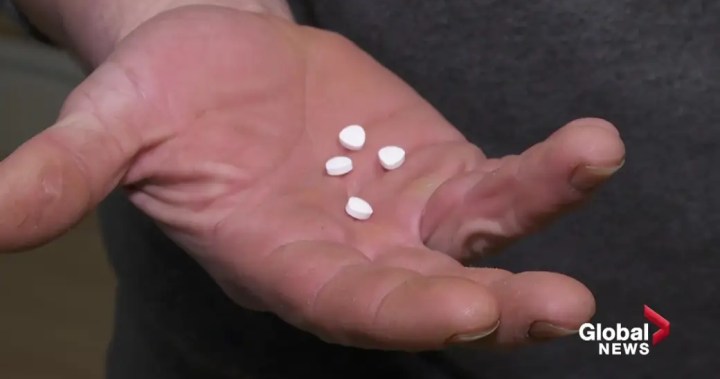Amid mounting pressure over the possible diversion of drugs from B.C.’s safer supply program, the provincial government now says it is in talks with health authorities to create some form of oversight committee.

Earlier this week, B.C. Public Safety Minister Mike Farnworth said RCMP had told him there was no evidence to suggest “widespread diversion” of safe supply drugs.

But in recent weeks, several RCMP detachments have reported finding government-issued hydrophone, also known as Dilaudid, in drug seizures.
“We’ve always found safe supply during search warrants. It’s always been a small amount, but when you’re seeing it at this level clearly it’s profit-driven,” Prince George RCMP Insp. Darin Rappel told media Monday.
With police finding drugs but politicians downplaying it, what does the public know about the extent of diversion?
Global News asked the Ministry of Mental Health and Addictions if it had ever hired or assigned anyone to work full-time on counter-diversion.
The ministry did not answer that question, instead responding with a list of efforts going on across government aimed at preventing diversion.
The latest health and medical news
emailed to you every Sunday.
The latest health and medical news
emailed to you every Sunday.
That list included working with police on monitoring the diversion of drugs, funding a support team at the BC Centre on Substance Use and BC Centre for Disease Control to monitor opioid use disorder incidents, and instructing health authorities to be on alert for diversion.

The ministry said prescribers also conduct urine tests on program participants to ensure they are taking their drugs and, in some cases, require witnessed consumption of the drugs.
“Following recommendations from Dr. Henry’s report on the government’s prescribed alternatives program, the Province is taking action to reduce the misuse of prescriptions by working to expand medication options to better meet the needs of people at risk of toxic-drug poisoning, making “witnessed” dosing the default for new medications, and updating clinical guidance on hydromorphone prescribing for select patients,” the ministry said.
It added that the province has been contact with the RCMP regarding the Prince George seizure to express that all police should have a system in place to confirm and track diverted safe supply.
“On the surface, just looking at it there’s many points and it looks like a strategy,” said Dr. Sharon Koivu, an addictions doctor based in London Ontario.
“But when you look line by line you can recognize that this is not going to be an effective strategy to monitor the problems with diversion related to safe supply,” she added.
“Actually to me it shows a lack of understanding of how drugs are used, it shows a lack of understanding of street culture … and it really shows a complete lack of accountability.”

Koivu said the consumption of safe supply drugs should be witnessed by medical professionals to ensure they cannot be diverted.
The leader of B.C’s Opposition BC United party called the strategy “totally inadequate.”
“What we need to do if they are genuinely serious about is to put markers on the safe supply … that they are giving out to people struggling with addictions so we can track where those drugs show up,” said Kevin Falcon.
Following the initial statement on Thursday, Minister of Mental Health and Addictions Jennifer Whiteside told Global News the province was considering a further recommendation by provincial health officer Dr. Bonnie Henry regarding the safe supply initiative.
“Some kind of a body that could provide advice on the development of the program, and we are certainly looking at that very carefully, having discussions around the health care system, with public health, about what a scientific and technical oversight committee might look like,” she said.
“We haven’t settled on that yet, but we are having discussions on what that might look like.”
© 2024 Global News, a division of Corus Entertainment Inc.



